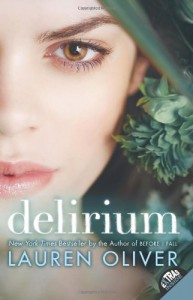Delirium (Delirium Series #1)

Delirium (Delirium Series #1) - Lauren Oliver
I had read some less than glowing reviews of this one but didn’t pay them any heed because I loved Liesl and Po and Before I Fall and was sure that Oliver’s superb writing skills would enchant me once again. Unfortunately, the main protagonists Lena and Alex were not that interesting to me. I found Hana, Lena’s best friend, and Grace, Lena’s cousin, far more engaging and there was too little of them.
Oliver tries to tackle a lot of topics in this book and does so rather convincingly, but maybe less would have been to succeed in satisfying this reader. Topical themes: choice, freedom, oppression, propaganda, manipulation of power, totalitarian regimes.
The main protagonist, Lena, is changed and transformed by the things she learns and has to un-learn.
In the future, in the isolated, fenced in, dystopian society love is recognised as a disease (amor deliria nervosa) and the cure is mandatory to take for every person once they reach maturity. To fall in love means to be infected by a disease that is said to ultimately lead to the death of the infected, who has to be culled from society in order to prevent further spreading. Having an infected person in the family is considered a social stigma, something frowned upon and to be hushed up. Unfortunately for Lena, who in the beginning believes the propaganda spilled by the government and looks forward to receiving the treatment once she’s turned 18, her mother was an incurable case who is said to have committed suicide rather than face another procedure with uncertain outcome. Hysteria and panic are used as powerful motivations to voluntarily agree to the invasive procedure.
There is a certain amount of rebellion within the comforts and luxuries the oppressive society allows, most notably expressed by Hana. To go beyond those boundaries is a question of balance of gain and loss. In turning her back on society and taking rebellion to the next level, Hana has a lot more to lose than Lena. Hana was generally more outspoken about society’s shortcomings in the early parts of the novel and also was the one to point out the lies and inconsistencies to Lena who never openly questioned society’s rules for fear of being outcast, severely punished for transgressing the law, and bringing shame on her aunt’s family.
Unfortunately, as great as the above mentioned premise is, Lena’s story did not engage me. I was bored for long stretches and hoped that she would just get on, make a decision, and take action ALREADY. Even though I can empathise with Lena’s emotional turmoil, I did not enjoy having to follow her extended reasoning and justification of her inaction again and again. And she still didn’t manage to win me over once her “transformation” had taken place. She seemed to make decisions for very selfish reasons without any regard for how they would affect the few people in her life she allegedly cared about deeply. Her thoughts and concern about them seemed fleeting and the intended search for (view spoiler) was a superficial pretext at best.
Oh, and a bloody dying dog?! Don’t do this to me, Lauren Oliver! This shit makes me cry so badly. It probably says more about me than the novel that this was (almost) the only time I was deeply moved, moved to tears, actually. But it works every time, whether in book or movie. Have an animal die, preferably after being horribly abused and I will be a crying, slobbering wreck, however bad said book or movie on the whole. It’s a cheap rick. Please refrain from employing it. :)

